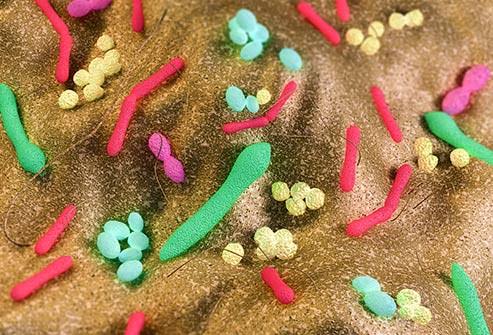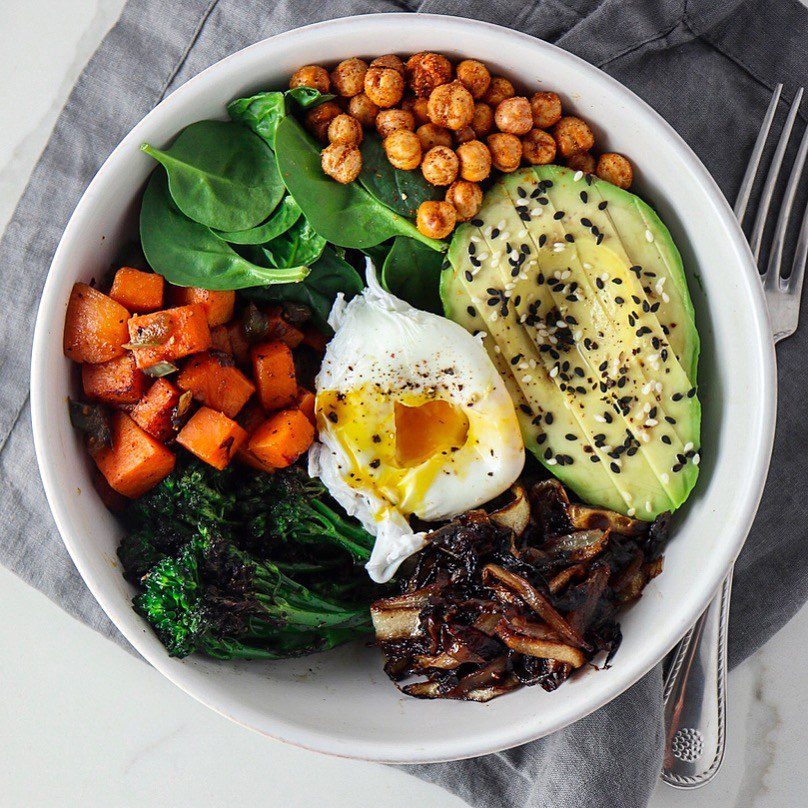
.
The Often Forgotten but Powerful “Nutrient” – Fibre
Dietary fibre needs a rebrand.
It is not the most sexy or glamorous sounding substance. In fact just the word “fibre” makes me think of older people eating prunes or bran muffins to keep “regular”!
But this super star also helps reduce our risk of bowel cancer, as well as heart disease and type 2 diabetes in addition to maintaining good bowel health (keeping regular!).
Plus fibre also balances our body’s use of sugars, which helps keep our hunger and blood glucose levels in check. Woohoo! And if that’s not enough to convince you of its merits…
Perhaps the really topical and exciting role of fibre right now though, is its potentially huge benefits to our gut health.
.
Gut Health
The term “Gut Health” is more than just our ability to digest food, and any symptoms or digestive issues (bloating, wind, diarrhoea, constipation, abdominal pain) we may experience.
Gut health also refers to the trillions of beneficial bacteria (also known as our microbiome) that live in our colon (large intestine) and have been implicated with a wide range of health benefits:
Mood – especially levels of depression and anxiety
Weight – whether our weight goes up or down
Nutrient absorption – the ability of our gut to absorb nutrients
Immune function – especially auto-immune issues
Inflammation – our gut bacteria produce a range of metabolites which can affect inflammation
Intestinal permeability – whether small particles enter through our intestinal lining
So, for good overall health we really want to keep these guys happy. And what is one thing that makes them happy? Fibre.
.
When we eat fibre, they eat fibre. And that makes them happy. So happy in fact that they produce a range of metabolites (such as short chain fatty acids) for us that have a positive and powerful effect on our health.
.

.
Types of Fibre
Fibre is the non-digestible part of plant foods. There are 2 main types – soluble fibre and insoluble fibre, and both have important roles in the body.
Warning – poo talk coming up!
.
Soluble fibre acts like a sponge and draws water in which helps make our poo softer and easier to move along the intestine. It also helps reduce blood cholesterol levels and improves blood glucose control. Soluble fibre is found in:
- Oats, rye and barley
- Legumes (chickpeas, lentils, black beans, hummus, falafels, baked beans)
- Chia seeds
- Broccoli, carrots and Jerusalem artichokes
- Avocado, apples, banana and prunes
- Nuts, especially almonds
.
Insoluble fibre acts as a bulking agent which also helps us poo more easily. People experiencing constipation, diverticular disease and hemorrhoids may benefit from increasing their intake of insoluble fibre (along with a good fluid intake)…start with small amounts though so you don’t worsen the problem. It is found in:
- Wholegrain breads and cereals
- Bran
- Legumes
- Nuts and seeds
- Fruit and vegetable skins (eating apple, pear and carrot skins is great…just give them a good wash first!)
.
There’s also a type of insoluble fibre called resistant starch which is being studied extensively. Turns out our gut bacteria really love resistant starch! Foods containing resistant starch include cooked and cooled potatoes/sweet potatoes/rice/pasta, oats, barley, green bananas and lentils. Roasting up a big tray of veggies (kumara, potato, carrot, beetroot and onion) for a delish roasted veggie salad with lentils and feta the next day will give you a real hit of resistant starch.
.
Healthy body and mind
If we want a healthy body and mind, along with a range of nutrients we need to ensure we’re eating plenty of fibre. Many New Zealanders are not eating enough fibre…the recommendations are for 25g a day for adult females and 30g a day for males. How can we improve this? A wide variety of colourful fruits and veggies, wholegrain, legumes, nuts and seeds daily should do the trick. In fact research suggests we should all aim for a minimum of 30 different high fibre plant foods each week. For ideas on increasing your intake, check out our Meal Plans in the Shop…our Autumn Veggie Meal Plan in particular is loaded with plant-based goodness.
.

.
Perhaps for the fibre rebrand we can just make sure we’re eating a wide range of plant foods everyday and follow Micheal Pollan’s easy advice:
“Eat food, not too much, mostly plants”
.
For a thorough review of your diet, along with personalised recommendations and practical strategies to increase nutrients get in touch for a Nutrition Consult. We can see you in-clinic, via Zoom or telephone. Or if your workplace would like a Gut Health workshop delivered at your work to delve into this topic further, check out our Workplace Wellness options.
